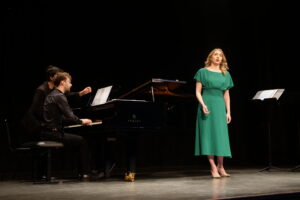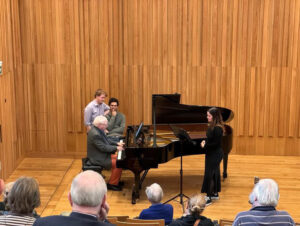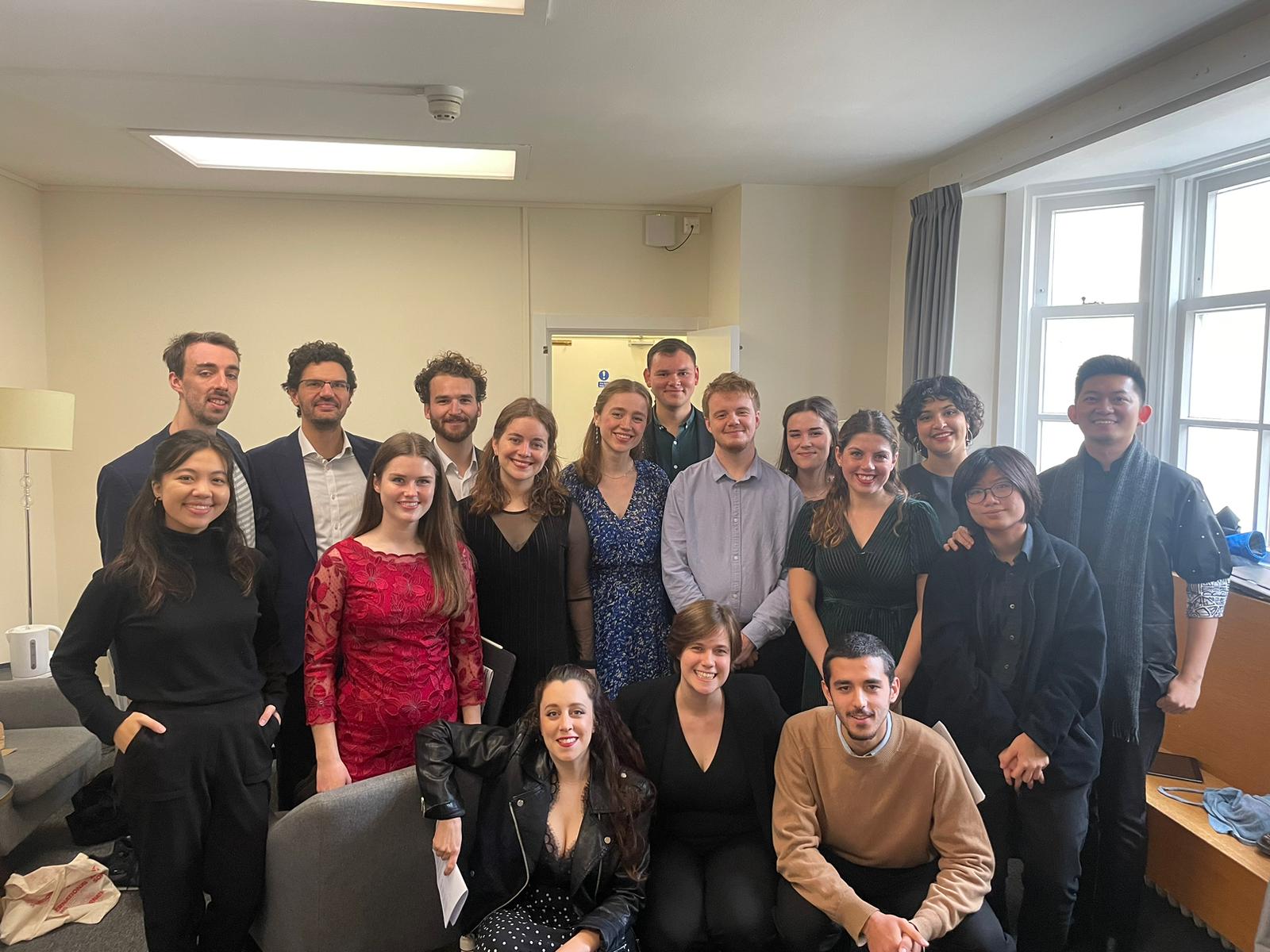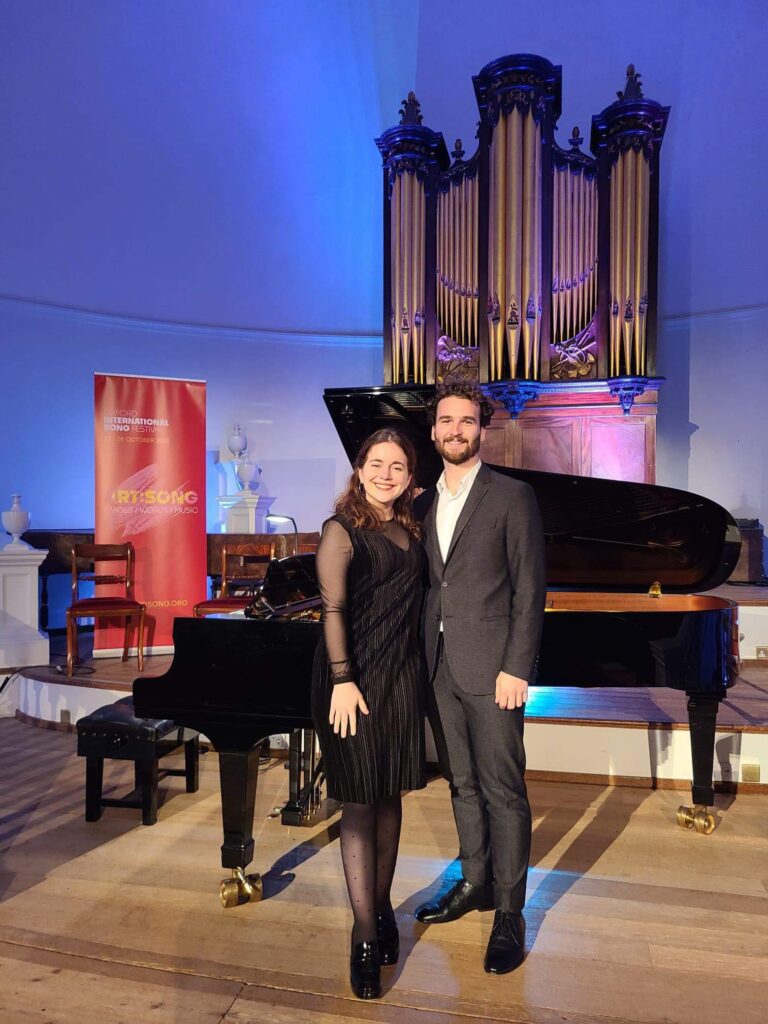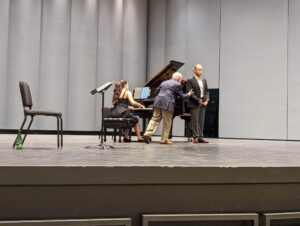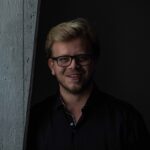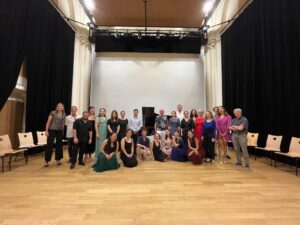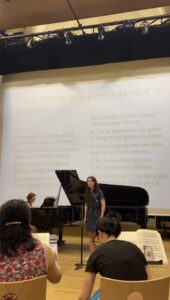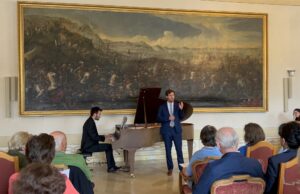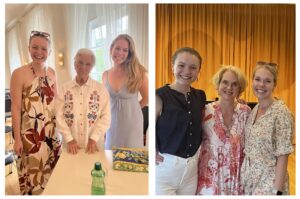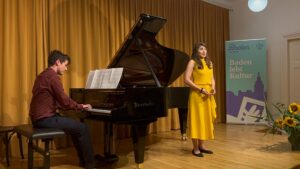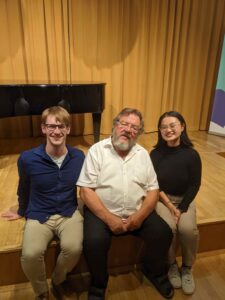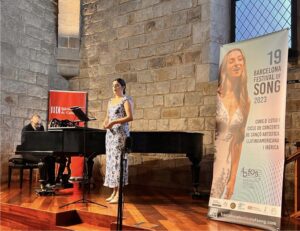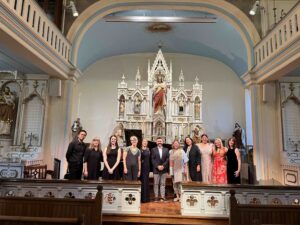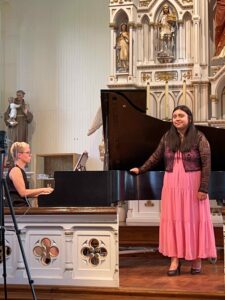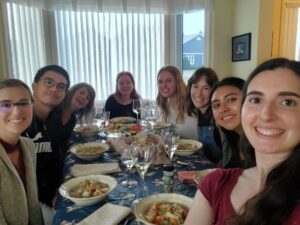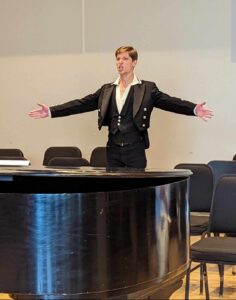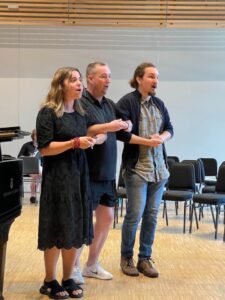The Foundation is honoured to have helped 18 participants attend programs in Europe and North America. Click on the tabs below to read about the young artists’ experiences.
Sydney Baedke, Soprano – Britten Pears Young Artist Programme, England
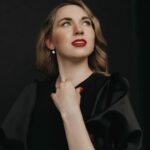 In June 2023, I had the opportunity of travelling back to beautiful Aldeburgh — a small seaside village on the coast of England famous for its fish and chips, rolling fields, and (perhaps above all else) being the hometown of Benjamin Britten and Peter Pears. With their Red House now converted into a series of archives dedicated to their shared legacy and the foundation they leave behind, Aldeburgh is also a short countryside drive from Snape Maltings, the maltings facility that Britten and Pears purchased with the aim of converting it into both a world-class concert hall and a training facility for young musicians, thus creating the Britten Pears Young Artist Program. Their endeavour succeeded and has stood the test of time, providing a home for world-class classical-music initiatives including the Aldeburgh Music Festival, Summer at Snape, and the year-long projects associated with Britten Pears Arts and its subsequent young-artist training program.
In June 2023, I had the opportunity of travelling back to beautiful Aldeburgh — a small seaside village on the coast of England famous for its fish and chips, rolling fields, and (perhaps above all else) being the hometown of Benjamin Britten and Peter Pears. With their Red House now converted into a series of archives dedicated to their shared legacy and the foundation they leave behind, Aldeburgh is also a short countryside drive from Snape Maltings, the maltings facility that Britten and Pears purchased with the aim of converting it into both a world-class concert hall and a training facility for young musicians, thus creating the Britten Pears Young Artist Program. Their endeavour succeeded and has stood the test of time, providing a home for world-class classical-music initiatives including the Aldeburgh Music Festival, Summer at Snape, and the year-long projects associated with Britten Pears Arts and its subsequent young-artist training program.
Throughout 2022/23, I have been fortunate enough to be a member of this young-artist cohort, first performing in The Rape of Lucretia at Snape Maltings and at London’s Royal Opera House in November, followed by my return for the Aldeburgh Music Festival’s Britten Song Trail. This short course on Britten Song involved group and individual study on all things Britten Song, culminating in a series of pop-up concerts throughout Aldeburgh that highlighted different facets of Britten’s compositional output. My pop-up concert, shared with a mezzo-soprano, violinist, violist, and collaborative pianist, consisted of duets and ensembles from Britten’s early years and was titled Duo Discoveries. After public masterclasses and private coachings with baritone Roderick Williams and Dame Ann Murray on the repertoire, I performed Britten’s Two Ballads for Two Voices and Sagesse from his Quatre chansons françaises (composed at the age of only 14!), and had the distinct honour of participating in the first public performance of Britten’s Variations on a French Carol for soprano, mezzo, violin, viola, and piano. This short program (repeated four consecutive times as part of the pop-up recital rotation) was held in the historic Jubilee Hall, the community theatre in Aldeburgh where many of Britten’s iconic works were premiered. Being able to share in the tradition of premiering a Britten composition in this space is especially humbling and is a memory I will treasure for the rest of my career in music.
Aldeburgh has served as an artistic oasis for me over the course of the last year; so to be able to return and dedicate myself to Britten Song this June was a joy-filled way to kick off my summer and contributed greatly to my ongoing artistic growth. I’m so thankful to the Art Song Foundation of Canada for providing me with financial resources to assist with the travel costs associated with this project and for the work they do to support Canadian artists in the early stages of their careers. The generosity of this foundation contributes to the ongoing legacy of excellence in Canadian musicians, both abroad and close to home. Thank you, ASFC!!
Bridget Esler, Soprano – Oxford International Song Festival, England
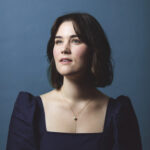 I have just returned from an inspiring week participating in the Oxford International Song Festival’s Mastercourse and am deeply grateful to the Art Song Foundation of Canada for making my studies there possible.
I have just returned from an inspiring week participating in the Oxford International Song Festival’s Mastercourse and am deeply grateful to the Art Song Foundation of Canada for making my studies there possible.
I travelled to Oxford with my duo partner, Luke Lally Maguire, and together we had the opportunity of participating in two masterclasses per day, one taught by the lead tutor Wolfgang Holzmair and the other led by one of the guest tutors: Anna Tillbrook, Graham Johnson, Anne Le Bozec, and Jan Philip Schulze.
At the end of the week, we performed in a lovely recital alongside the other Mastercourse students in the historic Holywell Music Room, which is renowned as the oldest purpose-built music room in Europe. My participation in the course included tickets to all of the recitals programmed during the festival, and I had the good fortune to attend many of them and learn through observing some of Europe’s top singers and pianists.
The week proved to be a wonderful retreat from the busyness of London and a perfect opportunity to focus intensively on a package of brand-new repertoire that Luke and I hope to use in recitals and competitions over the coming year.
The tutors each delivered specialized and highly valuable expertise. Anne Le Bozec brought a fine touch to the Poulenc songs we performed for her, sharing crucial ideas about the French style and providing background information on the poet that I hadn’t discovered anywhere else in my research. Graham Johnson was incredibly informative, as always, on the two Schubert songs we brought to him — songs on which he has written extensively. Wolfgang Holzmair’s concept of the ‘time accent’ is something that will inform my singing for a long time to come. These are just a few highlights of my learning!
Being immersed in the Oxford Song environment, which is so abuzz with musical talent, creative programming, and an enthusiastic, informed audience, has completely energized me! I have returned full of ideas for concert programs, excited to dive deeper in my repertoire, and emboldened to make bolder musical choices. I am very grateful for my time there.
Chloé Dumoulin, Piano – Oxford International Song Festival, England
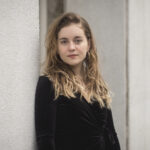 Thanks to the support of the Art Song Foundation of Canada, I had the incredible opportunity of participating in the 2023 Oxford International Song Festival’s Mastercourse, which was taught by lead tutor Wolfgang Holzmair, alongside guest tutors Graham Johnson, Jan Philip Schulze, Anne Le Bozec, and Anna Tilbrook.
Thanks to the support of the Art Song Foundation of Canada, I had the incredible opportunity of participating in the 2023 Oxford International Song Festival’s Mastercourse, which was taught by lead tutor Wolfgang Holzmair, alongside guest tutors Graham Johnson, Jan Philip Schulze, Anne Le Bozec, and Anna Tilbrook.
My song partner, baritone Olivier Bergeron, and I got the true Oxford experience as we were welcomed into this incredibly warm and cozy house, with the kindest hosts we could ask for. We then got to meet all the other participants in the Mastercourse, who were all very inspiring and humble. Every singer and every pianist — from Canada, USA, UK, Spain, Malaysia, Indonesia, Italy, and France — brought something unique to the table.
The whole week was spent practising, participating in private and public masterclasses, and listening to our colleagues, but most importantly, eating great food and watching the world’s greatest art song and lieder artists perform right there in Oxford.
In addition to the already impressive line-up of teachers we worked with, all the participants had sessions with Artistic Director Sholto Kynoch regarding the art of programming, as well as private lessons to work on repertoire. We even got to see manuscripts at the Bodleian Library’s Weston Library, where we took a look at Schumann and Schubert’s handwriting!
The week culminated with our concert, which took place at the Holywell Music Room, a hall with an incredible Steinway and wonderful acoustics. Everyone performed amazingly well and it was a true joy to share this moment with each other.
All in all, I am grateful to have been able to take part in this eye-opening Mastercourse and to have the opportunity to discover the beautiful city of Oxford!
Elisabeta Cojocaru, Piano – SongFest, Nashville, Tennessee
 Participating in SongFest as a collaborative pianist was a transformative journey into the world of art song and vocal chamber music, made possible by the Art Song Foundation of Canada’s generous support this past summer.
Participating in SongFest as a collaborative pianist was a transformative journey into the world of art song and vocal chamber music, made possible by the Art Song Foundation of Canada’s generous support this past summer.
SongFest provided invaluable educational opportunities for collaborative pianists like me. Through masterclasses, one-on-one coaching sessions, and workshops led by renowned faculty and guest artists, I honed my interpretive and collaborative skills. I had the privilege of performing in masterclasses and receiving guidance from exceptional artists such as Martin Katz, Katherine Jolly, Roger Vignoles, and Javier Arrebola.
One of the highlights was the chance to engage with contemporary composers, furthering the evolution of the art song repertoire. As part of the composer-mentorship program, I collaborated closely with emerging composers, expanding my craft, and sparking my artistic curiosity. Additionally, the program featured special curated concerts by faculty members, many of which I was delighted to perform in, such as the Russian Composer Concert and the Showcase of Spanish Composers throughout the centuries. What makes this program particularly engaging is that, alongside our work on art song repertoire with the faculty, they also offered personal insights through public lectures on topics like poetry, concert curation, German Lied, and French mélodie.
Beyond the educational aspects, SongFest’s alumni network connected me with a vibrant community of fellow artists, composers, and mentors, opening doors to exciting collaborations and professional opportunities.
My time at SongFest was a profound exploration of art songs, personal growth, and the creation of unforgettable musical moments. It reshaped my approach to collaborative work, and I’m confident that the skills and connections I gained will resonate throughout my musical career. I’m immensely grateful to the Art Song Foundation for making this experience possible, enabling me to pursue my passion for art song and collaborative work while fostering personal and professional growth.
Cole Knutson, Piano – Académie Orsay Royaumont, France
Where does one begin? That is always the question in circumstances such as this. At the time of writing this piece, I reflect deeply on the value that comes with the gift of opportunity. The right opportunity can serve as a key to new possibilities. Likewise, as a young artist in the realm of piano accompaniment (collaborative piano for my North American colleagues), few support structures exist that aim to grant young pianists various opportunities to explore curiosities, to learn, and to grow, with the potential to lead to various pathways for a brighter future.
That said, I have had the distinct privilege of being supported by the Art Song Foundation of Canada, an organization that provides necessary support for young singers and pianists in the field of art song, supporting and funding various valuable learning opportunities that present themselves for young artists.
I was first granted a bursary in 2018, giving me the opportunity to travel to Austria to attend, for the second time, the Franz Schubert Institut in Baden bei Wien, Austria. This program undoubtedly changed the trajectory of my life. I can say decisively that, without my experiences in Baden over two summers, my life would not have been nearly as enriching, joyous, and full as it is today. The support I received in 2018 ultimately led to the opportunity for a brighter future than I thought life had in store for me. More can be read about my experiences that summer in the Art Song Foundation of Canada’s superbly documented archive.
The Art Song Foundation of Canada most recently supported my endeavours to attend the first module of the Académie Orsay-Royaumont in France. This one-of-a-kind program offers only four duos the opportunity to be immersed in an enriching experience at the Fondation Royaumont, to learn from master teachers for four modules spaced throughout the year, and to engage, hands-on, with some of the greatest works of art the world has to offer.
The Fondation Royaumont is a former monastery that is now used to host all sorts of events, workshops, musical seminars, training programs, and so much more, especially for us young artists. The beautiful spaces, the seclusion in the countryside, and the generosity of the staff all contribute to an experience that is tailored to each musician. The meals are fantastic, three times a day, often with a team of chefs preparing each meal and each course.
During the summer module, my recital partner and I had the distinct pleasure of working with Matthew Rose and Brian Zeger, both excellent artists, teachers, and generous human beings. For the duration of our time at Royaumont, we spend a lot of time with the master teachers in a way that feels much less like a master/student relationship and much more like a mentorship. Each day consists of several hours of rehearsals and coachings, all culminating in a musical performance at the end of the module for locals who are regulars at the abbey.
There is ample spare time, which can be used to absorb what has been worked on in the day, exchange ideas with colleagues, take in the surroundings, practise, have many coffees, and so on. By all means, the experience sounds like a luxury, and it is. At the same time, it is incredibly intensive and that should not be left unmentioned.
In addition, there is a partnership with the Musée d’Orsay, where we spent whole days at the museum in total privacy to engage with some of the world’s finest works of art. Orsay has a team of specialists who are there to guide us as artists in our senses and with historical information to all of the works in the entire museum. It is an immense privilege that we can interact with the works directly and cultivate personal relationships with any number of masterworks in an intimate setting — relationships that will be lifelong. As musicians, we guide others in how to listen in the most subtle of ways. In this setting, it was incredible to trust the staff to help us not only to see but to feel, smell, hear, and taste the works. This led to some incredibly raw and emotional experiences for me personally. I felt in touch with my sensuality in such a deep and raw manner that I was literally brought to my knees at one point in front of Monet’s Les Glacons.
Part of the partnership between Orsay and Royaumont entails that, during each module (except for the introductory summer module), we, as artists, curate a short program to be performed in front of any works of art of our choice. The point is to present the music, poetry, and our performance as part of the whole experience for the public. These “musical promenades” are not advertised to the public; so there is a bit of an effect, similar to that of a flash mob. These performances are repeated several times over a few hours, hopefully giving more dimension and meaning to the public’s experience. They also serve as a reminder that one’s experience with art is a living, ephemeral phenomenon, not just an artifact.
The longer I live and the more I experience life, the more I realize the importance of the bigger picture. What I am interested in reaches beyond practical matters that only really serve as tools for expression, i.e., technique. My focus in current times is mostly on the depths of what it means to be human.
This first module came during the most difficult months of my life. Months before, I had landed a major contract that would have secured my future indefinitely. Ultimately, in the last seconds, I lost the contract for immigration reasons beyond everyone’s control. It was hard to receive that rejection as well as several other important rejections all at the same time. Then I was facing a very serious medical situation that had put me in and out of hospital for months, not knowing if this was going to be a life-long process. This, and the medications, were incredibly taxing on my body and my mind. Other personal issues included the cancer diagnosis of a dear friend and a life-changing diagnosis in my nuclear family, as well as the logistical challenges of trying to figure out a transition from the UK to Germany. It was a lot to take. Then, just a week before coming to France, at the peak of burnout, I nearly drowned in a lake near my hometown in Saskatchewan. Several days later, I found myself on a plane from Saskatoon to Paris to attend the first module of the Académie Orsay-Royaumont.
This program can be whatever the artist desires it to be. If one is in search of very specific technical or musical goals, the program will fulfill that. If one is in pursuit of exploring various musicological, artistic, and literary curiosities, likewise the program has everything one needs. In my case, what I needed was something much deeper. I needed sanctuary. I needed support. I needed art, music, and poetry. I needed space and quiet to begin the process of healing and understanding. I am grateful to have had that time, space, and support for that stage of my journey. My time in the first module at Royaumont gave me the opportunity not only to mend my soul, but to cultivate deeper understanding and meaning in my life.
One cannot overstate the value for an artist of being able to retreat and address matters that perhaps are easily forgotten in the hustle-bustle of a city. I believe that what we do as artists is, above all, a spiritual practice. Music, poetry, and art are the rocks that ground me in the most trying of times. Therefore, to have the freedom to go back to the heart of the matter means to have the freedom to find greater truth, understanding, and anchoring.
In the months following, I can see the immediate value of this time. My journeys have taught me the value of the motto “what doesn’t kill us makes us stronger”. This, in tandem with another cliché, “time heals all wounds”, couldn’t be truer in my case. This time to be immersed in such a caring, supportive, and stimulating environment set me on track for peak anti-fragility. About half a year on, I am feeling impeccably strong. I feel deeply grounded in my craft, more than ever before. I feel physically, emotionally, mentally, and spiritually in a place of heightened enlightenment. On the concert platform, I feel a consistent amount of release and ease with my musical partners. Beyond this, I feel strongly rooted in the “why” of what I do and can feel the difference it makes in my daily life.
In closing, I want to express my gratitude to the Art Song Foundation of Canada for their continuing support of young Canadian artists. One thought that has always lingered in my mind is, “What if?” This seemingly innocent question has led to some of the most enriching rabbit holes and experiences of my life. It also implies an investment in the proverbial tomorrow. What inspires me is the same curiosity that permeates the essence of the Art Song Foundation of Canada. The desire to support young artists and to grant them the gift of opportunity holds so much more power and potential than appears at first glance. In some cases, it holds the power to have a ripple effect, not only changing the lives and trajectories of young artists, but also of everyone they come in contact with. All I can hope for is that I can continue this tradition of making a difference in the world and in the lives around me. The time in Royaumont this past summer helped to repair and strengthen this desire, for which I am grateful to the Art Song Foundation of Canada.
Jerome de los Santos, Piano – Académie Francis Poulenc, Tours, France
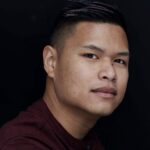 This summer, I had the incredible opportunity of participating in the 27th edition of the Académie Francis Poulenc in Tours, France, with mezzo-soprano Jillian Tam. Every summer, the faculty decide on a theme for all the pianist-singer duos to focus on, whether it be musical or poetic. This year, the theme was songs composed on poems by Jean Cocteau and Raymond Radiguet.
This summer, I had the incredible opportunity of participating in the 27th edition of the Académie Francis Poulenc in Tours, France, with mezzo-soprano Jillian Tam. Every summer, the faculty decide on a theme for all the pianist-singer duos to focus on, whether it be musical or poetic. This year, the theme was songs composed on poems by Jean Cocteau and Raymond Radiguet.
Each day is quite intense, starting with public masterclasses with all the members of the faculty, followed by private duo lessons in the afternoon. As a pianist, I particularly enjoyed my lessons with Jeff Cohen and Christian Ivaldi, as they are both experts in collaborative piano and especially in French mélodie. My favorite part of the Académie was the sessions we had with Thomas Le Colleter, who worked closely with Jillian and me on interpreting the text of the songs we were working on. Every duo had the opportunity to perform in two concerts: one in Tours at the Conservatoire Francis Poulenc and another at the closing concert in Noizay.
I really enjoyed my time at the Académie Francis Poulenc this summer and I cannot wait to return some day in the future! Special thanks to the artistic director, François Le Roux, for his dedication to and passion for French repertoire over the years, and for sharing his endless knowledge with students from all over. Thanks also to the Art Song Foundation of Canada for their continuing support!
Daria Tereshchenko, Soprano – Académie Francis Poulenc, Tours, France
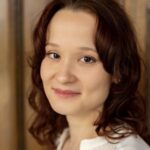 This August, I had the opportunity to participate in the Académie Francis Poulenc in the beautiful city of Tours, France. This summer, the program focused on a variety of French repertoire falling under specific themes: songs on poems by Jean Cocteau and Raymond Radiguet, songs by Eduard Lalo, songs on French texts or translations of French texts by Southern European composers, and of course, songs by Francis Poulenc. Additionally, there were living composers creating songs by the aforementioned poets commissioned by the academy.
This August, I had the opportunity to participate in the Académie Francis Poulenc in the beautiful city of Tours, France. This summer, the program focused on a variety of French repertoire falling under specific themes: songs on poems by Jean Cocteau and Raymond Radiguet, songs by Eduard Lalo, songs on French texts or translations of French texts by Southern European composers, and of course, songs by Francis Poulenc. Additionally, there were living composers creating songs by the aforementioned poets commissioned by the academy.
With a faculty of nine professors, the masterclasses and daily lessons covered all aspects of French mélodie. These included vocal technique, musical interpretation, diction, poetic meaning, and dramatic interpretation.
It was a pleasure to work with a new addition to the faculty this year: Vincent Vittoz, a stage director, who helped bring the songs to life through the lens of drama and action. After his classes, I felt that I could bring more life and presence to the pieces I was singing.
Before this program, I had not known of the poets Raymond Radiguet and Jean Cocteau. It was special to learn about them and hear repertoire that was new to me set to their texts. During the final concert, I sang a cycle called Alphabet by Georges Auric setting texts by Radiguet. This cycle is rarely done and was unknown to most of the faculty before we worked on it together. It was a pleasure to be able to present this little-known work to the general public.
During the morning masterclasses, I heard new pieces by the composers and poets that fall under the themes of the academy. As well, I had the opportunity to perform several selections from my repertoire. A particularly meaningful performance for me was singing Poulenc’s song cycle Deux Poèmes de Louis Aragon. The city of Tours sits on the Loire River, which is mentioned in the mélodie. I believe that I was able to comprehend this cycle on a deeper level while I was in France.
I would like to thank the donors of the Art Song Foundation of Canada for providing me with support to attend the Académie Francis Poulenc!
Jillian Tam, Mezzo-Soprano – Académie Francis Poulenc, Tours, France
 Thanks to the generous support from the Art Song Foundation of Canada, I had the opportunity of attending the Académie Francis Poulenc in Tours, France, this past August. After meeting and working with François le Roux at the Lachine International Vocal Academy just a couple months before, I had the absolute pleasure of continuing our work together and delving into the extremely difficult and rewarding pieces of the French mélodie genre. Along with François and his inspired approach to teaching, I was able to work closely with renowned coaches Vincent Vittoz and Anne Constantin, literary expert Thomas le Colleter, and pianists Christian Ivaldi and Jeff Cohen, who is the Chef de Chant at the Opera Nationale de Paris.
Thanks to the generous support from the Art Song Foundation of Canada, I had the opportunity of attending the Académie Francis Poulenc in Tours, France, this past August. After meeting and working with François le Roux at the Lachine International Vocal Academy just a couple months before, I had the absolute pleasure of continuing our work together and delving into the extremely difficult and rewarding pieces of the French mélodie genre. Along with François and his inspired approach to teaching, I was able to work closely with renowned coaches Vincent Vittoz and Anne Constantin, literary expert Thomas le Colleter, and pianists Christian Ivaldi and Jeff Cohen, who is the Chef de Chant at the Opera Nationale de Paris.
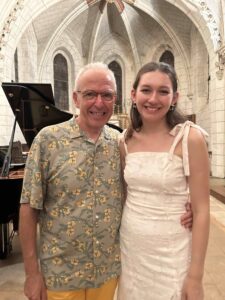 The mornings consisted of masterclasses with the entire faculty of nine professors teaching simultaneously. I had never experienced a masterclass format like this, and it was truly amazing to witness how passionate the professors are about French music and poetry. The professors would add on to each other’s ideas, debate textual significance, and were always curious about our input as well. It was also a wonderful opportunity to improve my French, as the masterclasses, lessons, and lectures are all taught entirely in French.
The mornings consisted of masterclasses with the entire faculty of nine professors teaching simultaneously. I had never experienced a masterclass format like this, and it was truly amazing to witness how passionate the professors are about French music and poetry. The professors would add on to each other’s ideas, debate textual significance, and were always curious about our input as well. It was also a wonderful opportunity to improve my French, as the masterclasses, lessons, and lectures are all taught entirely in French.
On the day of our final concert, we had the opportunity to visit Poulenc’s house before our performance at Noizay’s church in the Poulenc Village. We had the privilege of seeing his beautiful estate, drinking wine from his vineyard, and playing on his piano. That night, I performed excerpts from one of Poulenc’s most famous cycles Tel jour telle nuit. Performing Poulenc’s music in the church where he is from was an intimate and personal experience that I feel so fortunate to have taken part in.
I would like to express my gratitude to the Art Song Foundation for making this opportunity possible for me and continuing to support me on my musical journey.
Evan Lindberg, Bass-Baritone – Franz-Schubert-Institut, Austria
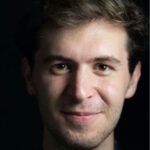 Thanks to the generous support of the Art Song Foundation of Canada, I had the marvellous opportunity of attending the Franz-Schubert-Institut in Baden bei Wien this past summer. I had been eager to attend this Institut for a few years, but unfortunately COVID made it impossible to apply in previous summers. Therefore, it was incredibly fulfilling to finally be able to experience the magic of this program, about which I had heard nothing but good things from colleagues who had attended the institute in the past.
Thanks to the generous support of the Art Song Foundation of Canada, I had the marvellous opportunity of attending the Franz-Schubert-Institut in Baden bei Wien this past summer. I had been eager to attend this Institut for a few years, but unfortunately COVID made it impossible to apply in previous summers. Therefore, it was incredibly fulfilling to finally be able to experience the magic of this program, about which I had heard nothing but good things from colleagues who had attended the institute in the past.
I believe I can speak for all of us who attended the institute when I say that the experience was enriching, artistically rewarding, and, in many ways, life-changing. The program is demanding — it’s a five-week intensive during which each pianist/singer duo coaches intensively on 27 Lieder and performs in 18 masterclasses for eight different master teachers. These teachers included esteemed artists such as Elly Ameling, Robert Holl, Helmut Deutsch, Julius Drake, Roger Vignoles, Wolfram Rieger, and Canada’s own Michael McMahon! Effectively, as a duo, you are performing in a masterclass nearly every day.
The beauty of the program lies, however, in its intensity. The institute revels in a detailed, methodical, and holistic approach to German Lieder. There is no other program I can think of where one is so fully immersed in all aspects of Lieder. As a participant, not only do you get to study under the pre-eminent artists of the genre, but you also take part in a daily poetry seminar, coachings with Austrian actors and directors, and intensive diction/recitation sessions. Alongside all of this, we took many walks in the Vienna woods, where none other than Mozart and Beethoven once roamed! A highlight was performing Mozart’s Ave verum corpus in the church it was written for (which is across the street from where the daily masterclasses take place). To say that all of this is inspiring for emerging performers, scholars, and lovers of German Lieder such as ourselves would be a massive understatement.
I am grateful to have worked so closely with the phenomenal pianist, John Morefield, for the five weeks. John is currently a doctoral student at the University of Michigan and, like me, had been hoping to attend the institute for a number of years. Collaborating with John was an artistic highlight of the summer. Our personalities and musical ideas/instincts were an intuitive fit from the beginning, and by the end of the summer, I felt more and more as if we shared a brain. The intense collaboration that this program allows a piano/singer duo to experience and, as a result, to grow is a rare and special opportunity, and one that we did not take for granted.
I would like to extend my gratitude and sincere thanks to the Art Song Foundation of Canada for their ongoing generous support of young musicians like myself. Art song is a balm for the soul and a gift to all of us who encounter, study, listen to, and perform it. The Art Song Foundation provides tremendous support to artists and, in doing so, ensures that this beautiful art form will continue to touch and inspire the hearts of generations to come.
Christina Thanisch-Smith, Soprano – Franz-Schubert-Institut, Austria
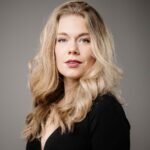 Thanks to the Art Song Foundation of Canada’s financial support, I was able to participate successfully in this summer’s master course at the Franz-Schubert-Institut in Austria. The five-week-long course consisted of daily poetry seminars, focusing on the prominent poets of Lieder, followed by two masterclasses, and private lessons and coachings with world-class instructors.
Thanks to the Art Song Foundation of Canada’s financial support, I was able to participate successfully in this summer’s master course at the Franz-Schubert-Institut in Austria. The five-week-long course consisted of daily poetry seminars, focusing on the prominent poets of Lieder, followed by two masterclasses, and private lessons and coachings with world-class instructors.
The masterclasses were taught by eight of Europe’s finest Lieder specialists, including Elly Ameling, Robert Holl, Julius Drake, Helmut Deutsch, Wolfram Rieger, Roger Vignoles, Andreas Schmidt, and Birgid Steinberger. The opportunity to work with each of these established professionals over the course of 35 days is a once-in-a-lifetime experience that I will be forever grateful for. I was completely inspired by the attention to detail that each master-teacher demanded from us and learned several invaluable lessons about Lieder preparation and performance practices. I will never forget Elly Ameling’s demand for molto legato — she would often remind us that each note becomes “pregnant” with the following note — or the degree of specificity of long and short vowels that Robert Holl strives for.
I am happy to say that, after a three-year hiatus due to the pandemic, the Franz-Schubert-Institut is alive and well. It was an incredible experience to be an artist in residence this summer, and I cannot recommend the program more to any aspiring singer with a love for Lieder. There were several Canadians in attendance this summer, and I believe each of us maintained the standard of excellence and good reputation that past ASFC bursary recipients have set during past years.
Sophie Naubert, Soprano – Franz-Schubert-Institut, Austria
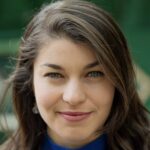 Having a great affinity for German language, I had the wonderful opportunity to participate in the Franz-Schubert-Institut for five weeks in Baden, Austria, over the 2023 summer. Each participant performed a total of 27 German art songs in open masterclasses for world-renowned collaborative pianists and singers such as Helmut Deutsch, Julius Drake, Robert Holl, and Elly Ameling, who turned 90 years old this year and is still a peppy and energetic woman! Each master brought his or her own profound approach to the German Lied and encouraged us students to heavily prioritize the poetry with utmost meaning, as artists have a duty to deliver a strong message to the audience.
Having a great affinity for German language, I had the wonderful opportunity to participate in the Franz-Schubert-Institut for five weeks in Baden, Austria, over the 2023 summer. Each participant performed a total of 27 German art songs in open masterclasses for world-renowned collaborative pianists and singers such as Helmut Deutsch, Julius Drake, Robert Holl, and Elly Ameling, who turned 90 years old this year and is still a peppy and energetic woman! Each master brought his or her own profound approach to the German Lied and encouraged us students to heavily prioritize the poetry with utmost meaning, as artists have a duty to deliver a strong message to the audience.
Along with these masterclasses, we had daily one-on-one lessons with Austrian actors and diction coaches to work on poetry declamation, as well as voice and musical coachings to help us prepare our pieces for the public masterclasses. There was definitely a strong sense of community within the institute. Both the teachers and the participants were very positive and supportive of one another. Sunday’s social activities, such as hiking, seeing beautiful landscapes, and visiting neighbouring cities, were included in the program.
I am very grateful to the Art Song Foundation of Canada for having helped me financially with this extraordinary project.
Christopher Knopp, Piano – Franz-Schubert-Institut, Austria
 For a developing art song performer and coach, progress is often hard to define. However, this summer, my experience at the Franz-Schubert-Institut facilitated so much growth in the depth of my knowledge and passion for Lieder that I feel I have a completely new relationship with the art form. I have noticed eight specific ways in which my thinking has been enriched.
For a developing art song performer and coach, progress is often hard to define. However, this summer, my experience at the Franz-Schubert-Institut facilitated so much growth in the depth of my knowledge and passion for Lieder that I feel I have a completely new relationship with the art form. I have noticed eight specific ways in which my thinking has been enriched.
First, I interacted with some of the greatest minds dedicated to Lieder in the world. We spent 15 hours in masterclass with eight different masters whose names I have been hearing since my interest in art song began. Elly Ameling, Julius Drake, Helmut Deutsch, and Robert Holl are among the artists who, to me, have reached the pinnacle of communicative ability in this discipline. I also worked with scholars such as Richard Stokes and Natasha Loges, whose writings I encounter almost every day as I research the pieces I’m working on, and coaches of diction, music, and poetry like Michael McMahon and Gabriel Jacoby. I feel that, from my interactions with these artists, I have gained a wide repertoire of approaches to song.
Second, I was inspired by the talent and dedication of my colleagues. It was extremely enriching to engage in discussions about text and song, to sight-read, and to recite poetry with other people on the same path as myself. I believe that something very special happens when passionate people working on the same problems are willing to bare their thoughts to one another.
Third, my familiarity with the repertoire was greatly expanded. I now feel I have a serious understanding of the Italienisches Liederbuch and the Mörike Lieder of Wolf, all of the important song cycles of Robert Schumann, the Goethe songs of Schubert, the Mignon Lieder by various composers, the early songs of Schoenberg and Berg, and the folk songs of Brahms. In addition, I am now familiar with many poets about whom I knew little before the course, and my appreciation for their importance, both in how they shaped world history and in how central their role is to art song, has increased tremendously.
Fourth, my experience of poetry is qualitatively different. I was given new tools for interpretation and recitation, and grew to become intimately familiar with the styles and trends of the art form. I now realize that the text of an art song should be seen as the whole cause for the work, and that the true meaning of the piece can only be communicated when one has a real interest in the value of the poetry that inspired it.
Fifth, I realized the value of dedicating a long period of time to enriching my knowledge of a specific branch of music. Since I started my university career in 2015, I have been working as a coach and collaborative pianist, as well as competing in solo piano competitions. However, working as a collaborator and teacher while studying often necessitated prioritization and compromise, and I rarely felt that I had the time to devote to deepening a specific focus for an extended period. After having finally done so this summer, I plan to incorporate more similar periods into my life of my own volition, so that I can continue to experience this type of growth.
Sixth, I was given an invaluable chance to work intensely with my duo partner, Jing. We have competed together in competitions and prepared recital programs together, but this month when we had only each other to work with, and only our shared repertoire to practise, deepened our understanding of each other in a way that I did not expect. I feel now that we have something unique to say together that is greater than the sum of its parts, and I am incredibly excited to share that with our future audiences.
Seventh, I was extremely grateful to experience the appreciation for classical music that our audiences exhibited. The best way I can explain it is that I felt no need to justify our art form. I have often felt that, to the average person, dedication to poetry and music seems superfluous and indulgent. Why would you study the music of dead Europeans instead of trying to progress the efforts of science? It was an incredible feeling to perform in Baden and realize that the audiences both understood the texts that we were sharing and knew how meaningful they were, without our having to explain. This attitude is one that I intend to carry with me.
Finally, I was struck by the occasional performances that transcended ‘talent’. During one of the first masterclasses, one of my young colleagues performed Schubert’s Nacht und Träume, and I was so struck by the beauty and sincerity of his performance that I lost the critical lens through which I normally listen. This summer, I experienced on several occasions this kind of collaborative enjoyment of a performance that was extremely precious to me. This culminated in a performance that Jing and I gave of Wolf’s Ganymed in which I felt free from the pressure to impress and out-perform my colleagues, and my only goal was to show the audience how wonderful the poetry was and to touch them meaningfully through our art.
I am extremely grateful for the bursary that I received from the Art Song Foundation of Canada, which significantly relieved the pressure of the high tuition, flight, and living costs associated with going to Europe for more than a month and studying at the Schubert Institute. I hope that my report conveys how enriching this experience was for me and provides motivation to those with the ability to do so to continue acting as catalysts for musical growth in young Canadian musicians.
Mia Robles, Soprano – Barcelona Festival of Song, Spain
 I am thrilled to report that, last night, I performed at the beautiful final concert of the Barcelona Festival of Song (BFOS). This program, though only two weeks long, has been filled with academic learning and performing repertoire not typically taught at our Canadian music institutions.
I am thrilled to report that, last night, I performed at the beautiful final concert of the Barcelona Festival of Song (BFOS). This program, though only two weeks long, has been filled with academic learning and performing repertoire not typically taught at our Canadian music institutions.
Dr. Patricia Caicedo — soprano, musicologist, doctor, and many more brilliant accomplishments — is the mastermind behind this program. She developed it to fulfill her mission: decolonizing the art song world. A typical day consisted of lectures (on historical content that related to the musical region of the day), diction coaching, a masterclass, lunch break, a second masterclass, and attending a concert to hear wonderful international artists who participated in BFOS. Every day, we rotated between regions: Latin America and Brazil, Catalunya, Spain. This meant that we were immersed in the proper context and background to help us deliver the most authentic and well-informed performances of their repertoire at our final student concerts. Some examples included the importance of understanding the independence movement in Catalunya, the importance of Indigenous music and its influence in Latin American music, and the deconstruction of the division between Art Song, Folk Music, and Popular Song constructs.
Additionally, we received intense coaching on several languages and their numerous regional differences, including Spanish as it is spoken in different Latin American countries, Brazilian Portuguese, Spanish as it is spoken in Iberia, and Catalán, the language of Catalunya. These coaching sessions were presented to us using both IPA and masterclasses with native speakers of each language who were familiar with these languages when singing, such as the wonderful Brazilian opera singer, Flavio Mello.
I leave this program with a full heart. I have longed to channel my Peruvian culture through song, and I finally feel that I have found a community that sees who I am and that our music is just as valuable as the music of the Western canon. I am excited to bring this beautiful repertoire back to Canada with me and to continue to push against the current to encourage the inclusion of non-Eurocentric classical music in our curriculum. I learned why this music has been looked down upon by many institutions and how important it is to decolonize the mind. It should no longer be acceptable to discredit the intense skill and emotional knowledge it takes to perform this repertoire successfully. There is real beauty to be found in this music. It requires feelings, different and challenging techniques, and listening to the voices of communities that continue to be ignored. I sincerely thank the ASFC for supporting this journey.
Anson Ng, Piano – Barachois Summer Music Academy, New Brunswick
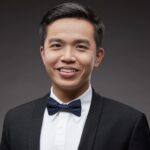 This summer, I had an enriching experience at the Barachois Summer Music Academy, and it will influence my music path as a pianist and as a general musician.
This summer, I had an enriching experience at the Barachois Summer Music Academy, and it will influence my music path as a pianist and as a general musician.
The academy is a ten-day intensive program and I got to work with several singers. We received daily coaching from the teachers: Laura Loewen, Julien Leblanc, Nathalie Paulin, and Monica Whicher. We also had poetry and diction classes with Jaclyn Grossman and Pierre Heault. At the end of the program, we performed in Barachois, Fredericton, and Charlottetown.
One thing I really like about this program is that its repertoire focuses on Canadian art songs, under-represented composers, and duets. This allowed me to study and explore interesting works, including Louis-Dominique Roy’s Arbres, Harry Somers’s Loon cry, night call, Anna Cazurra’s Tensho, Francesca Hauser’s Altitude, and Alice Ping Yee Ho’s Flood (from Three Songs from the Tang Dynasty).
Thanks to generous support from the Art Song Foundation of Canada, I was able to be part of the Barachois program to learn more as a musician and have the opportunity to present Canadian songs to the community. It was truly a rich and awesome experience.
Gabriela Comeau-Gort, Mezzo-Soprano – Barachois Summer Music Academy, New Brunswick
 With the generous help of the Art Song Foundation of Canada, I attended the Barachois Summer Music Academy in Moncton, New Brunswick. This summer intensive was led by an amazing group of teachers: pianists Julien LeBlanc and Laura Loewen, and sopranos Nathalie Paulin and Monica Whicher. My piano partner and I had individual coachings with them every day, during which we worked on the repertoire assigned to me. I left each lesson having learned something new and feeling more confident about my interpretation, technique, and diction. All four teachers brought a fresh perspective and were incredibly attentive and supportive.
With the generous help of the Art Song Foundation of Canada, I attended the Barachois Summer Music Academy in Moncton, New Brunswick. This summer intensive was led by an amazing group of teachers: pianists Julien LeBlanc and Laura Loewen, and sopranos Nathalie Paulin and Monica Whicher. My piano partner and I had individual coachings with them every day, during which we worked on the repertoire assigned to me. I left each lesson having learned something new and feeling more confident about my interpretation, technique, and diction. All four teachers brought a fresh perspective and were incredibly attentive and supportive.
I was drawn to this program because of its uniqueness. The repertoire assigned to us highlighted under-represented composers. This year, it included Canadian and Latin-American composers, which are of particular interest to me because of my diverse heritage and my own research, which aims to bring more Latin-American music to Canada. I was able to learn and sing works of composers I had never heard of before and pay homage to both my Canadian and Latin-American roots.
I performed Les lions jaunes by French-Canadian composer Pierre Mercure from his cycle Dissidence and three songs by Cuban composer Gisela Hernández: Remansillo, Huerto de marzo, and Solo por el rocío. Because we were given the music before the start of the program, it was easy to jump straight into the lessons and to explore other aspects of the music, which helped me get the most out of the coachings.
Two things I struggle with are stage presence and French diction; so the pieces chosen for me were perfect to help me work on my artistry. Both Monica and Nathalie have performed Les lions jaunes during their careers and were able to share important things to think about, such as the significance of the poetry (historical context, possible allegories) and their own experiences performing the piece. Julien and Laura gave me valuable tips and tricks for diction and interpretation, and pushed me to pay attention to every little detail in the music.
There were many highlights of this program, including but not limited to: performing in the beautiful Barachois Historic Church, a day trip to PEI, meeting other young, passionate, and driven musicians, an online seminar with artists Jaclyn Grossman and Pierre Heault about individuality and entrepreneurship in the music industry, and a masterclass with Nathalie Paulin.
Although the program is only ten days long, all the students felt so incredibly close to each other by the end and I so value the friendships I have made. The staff and coordinators at Barachois were so caring and went above and beyond for us to ensure that we were comfortable, which allowed us to focus on learning and performing at our best. I am so grateful to the Art Song Foundation for their support and I will encourage others to apply to this program.
Jenine Evans, Piano – Barachois Summer Music Academy, New Brunswick
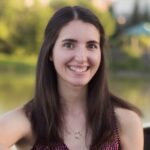 With the support of the Art Song Foundation of Canada, I had the privilege of participating in the Barachois Summer Music Academy from July 29 to August 6, 2023. This was my second year participating in the Emerging Artist Program. I benefited from already being accustomed to the University of Moncton campus, where I practised and had coachings, and the general structure of the program, but there was always something new for me to learn and work on. With the help of my supportive teachers — Julien LeBlanc, Laura Loewen, Nathalie Paulin, and Monica Whicher — my colleagues and I prepared a concert of French, English, Spanish, and Catalan art song by under-represented poets and composers. In addition to daily coachings, I had the opportunity to participate in poetry classes and attend a talk about navigating a career as a performer.
With the support of the Art Song Foundation of Canada, I had the privilege of participating in the Barachois Summer Music Academy from July 29 to August 6, 2023. This was my second year participating in the Emerging Artist Program. I benefited from already being accustomed to the University of Moncton campus, where I practised and had coachings, and the general structure of the program, but there was always something new for me to learn and work on. With the help of my supportive teachers — Julien LeBlanc, Laura Loewen, Nathalie Paulin, and Monica Whicher — my colleagues and I prepared a concert of French, English, Spanish, and Catalan art song by under-represented poets and composers. In addition to daily coachings, I had the opportunity to participate in poetry classes and attend a talk about navigating a career as a performer.
After several busy days of collaborating and learning, the Emerging Artist group set out to perform on three consecutive days in three different towns: Barachois, New Brunswick; Fredericton, New Brunswick; and Charlottetown, Prince Edward Island. It was a unique opportunity to work on my performance skills, which included managing my nerves while addressing different audiences, adapting to each space’s varied acoustics and instrument, and performing in a spontaneous and musically instinctive way.
Although I spent a lot of time working on my craft at the Barachois Summer Music Academy, I also had many chances to gather with old and new friends. We had several delightful group meals including my favourites: homemade seafood chowder in New Brunswick and freshly baked hand pies in PEI!
I am so grateful for the connections and friends I made, as well as the knowledge and experience I acquired at the Barachois Summer Music Academy. I am proud of this accomplishment and am excited to bring what I have learned into the second year of my collaborative piano master’s degree.
Thank you to the Art Song Foundation of Canada and its donors for helping make this incredible experience possible!
Alastair Thorburn-Vitols, Baritone – Ukrainian Art Song Summer Institute
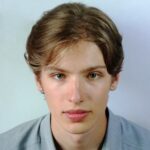 Thanks to generous support from the Art Song Foundation of Canada, I was fortunate to study and perform with the Ukrainian Art Song Summer Institute from August 21 to 27 at the Royal Conservatory of Music’s Temerty Theatre. This program trains singers in dramatic analysis of Ukrainian poetry and music through daily coachings, masterclasses, and guest lectures, culminating in a sold-out concert. Coachings and masterclasses included vocal technique and dramatic choreography with Benjamin Butterfield and Andrea Ludwig, which helped me cultivate a more expansive sound. With Melanie Turgeon, we also learned Ukrainian diction, poetry translations, and the poems’ historical context. Participants worked closely with collaborative pianists Leanne Regehr and Steven Philcox. We also listened to a guest lecture by Kathleen Manukyan (Slavic Studies, University of Pittsburgh) about how political turmoil created many alternative versions of the Ukrainian story Taras Bulba, including two books by Nikolai Hohol and an opera by Mykola Lysenko.
Thanks to generous support from the Art Song Foundation of Canada, I was fortunate to study and perform with the Ukrainian Art Song Summer Institute from August 21 to 27 at the Royal Conservatory of Music’s Temerty Theatre. This program trains singers in dramatic analysis of Ukrainian poetry and music through daily coachings, masterclasses, and guest lectures, culminating in a sold-out concert. Coachings and masterclasses included vocal technique and dramatic choreography with Benjamin Butterfield and Andrea Ludwig, which helped me cultivate a more expansive sound. With Melanie Turgeon, we also learned Ukrainian diction, poetry translations, and the poems’ historical context. Participants worked closely with collaborative pianists Leanne Regehr and Steven Philcox. We also listened to a guest lecture by Kathleen Manukyan (Slavic Studies, University of Pittsburgh) about how political turmoil created many alternative versions of the Ukrainian story Taras Bulba, including two books by Nikolai Hohol and an opera by Mykola Lysenko.
All singers performed two solo songs, a duet or trio, and a full ensemble piece. My first solo was Mykola Lysenko’s Het’many, describing a 1768 Cossack rebellion against Polish rule. The text was an excerpt of Taras Shevchenko’s epic poem Haidamaky. I then sang the duet Ode to a Swallow by composer Ostap Nyzhankivsky and poet Volodymyr Navrotsky with tenor Andrew Wolf. We staged this duet as an allegory for a father/son separation; as a baritone, I played the role of the father, despite being the youngest UASP participant. My second solo, My Joy Was But A Dream, is one of Denys Sichynsky’s last works before he died of throat cancer and describes the composer’s grief, fear, and then acceptance that happiness in life is an illusion. The concert ended with the full ensemble piece At Night on the Burial Mound by Kyrylo Stetsenko and Borys Hrinchenko, commemorating those who fought for Ukraine’s independence over many centuries. In all pieces, the poetry is beautifully expressive, but it’s challenging to memorize in a language that’s not related to any that I understand. I gained valuable insight into Ukrainian linguistics and culture through UASP, including how to read the Cyrillic alphabet. I appreciate being exposed to the extensive repertoire of Ukrainian art songs and learning the skills necessary to perform works from this excellent but often overlooked musical tradition.
Outside of structured coachings, participants were immersed in Ukrainian culture and musical education through conversations and friendships with faculty and colleagues. The faculty generously provided extra feedback outside scheduled instruction, and many students visited the Ukrainian Museum of Canada during breaks. I am very grateful to have experienced such incredible artistry and cultural exchange through the Ukrainian Art Song Project in such an enjoyable and supportive environment. Your generous support inspires me to promote more Ukrainian music in future concerts.
Ian Bannerman, Tenor – Ukrainian Art Song Summer Institute
 I had a wonderful time at the Ukrainian Art Song Institute’s 2023 Summer Program. The faculty there are truly among the best in Canada and they were a joy to work with. The program ran from Monday to Sunday; unfortunately, I tested positive for COVID on the Saturday (the day before the final concert). However, while I was unable to perform in the final concert, I still felt fulfilled from having five days of lessons and workshops, learning from the incredible faculty there as well as the other participants.
I had a wonderful time at the Ukrainian Art Song Institute’s 2023 Summer Program. The faculty there are truly among the best in Canada and they were a joy to work with. The program ran from Monday to Sunday; unfortunately, I tested positive for COVID on the Saturday (the day before the final concert). However, while I was unable to perform in the final concert, I still felt fulfilled from having five days of lessons and workshops, learning from the incredible faculty there as well as the other participants.
Thank you to the Art Song Foundation of Canada for helping me to participate in this program. It gave me knowledge and insight into Ukrainian music, which I will absolutely apply, working with the bustling Ukrainian music community in my home town of Edmonton. It also helped to develop further my artistic abilities as an interpreter of art song and will influence how I teach art song to the 25 to 30 voice students I will work with as a teacher this year.

